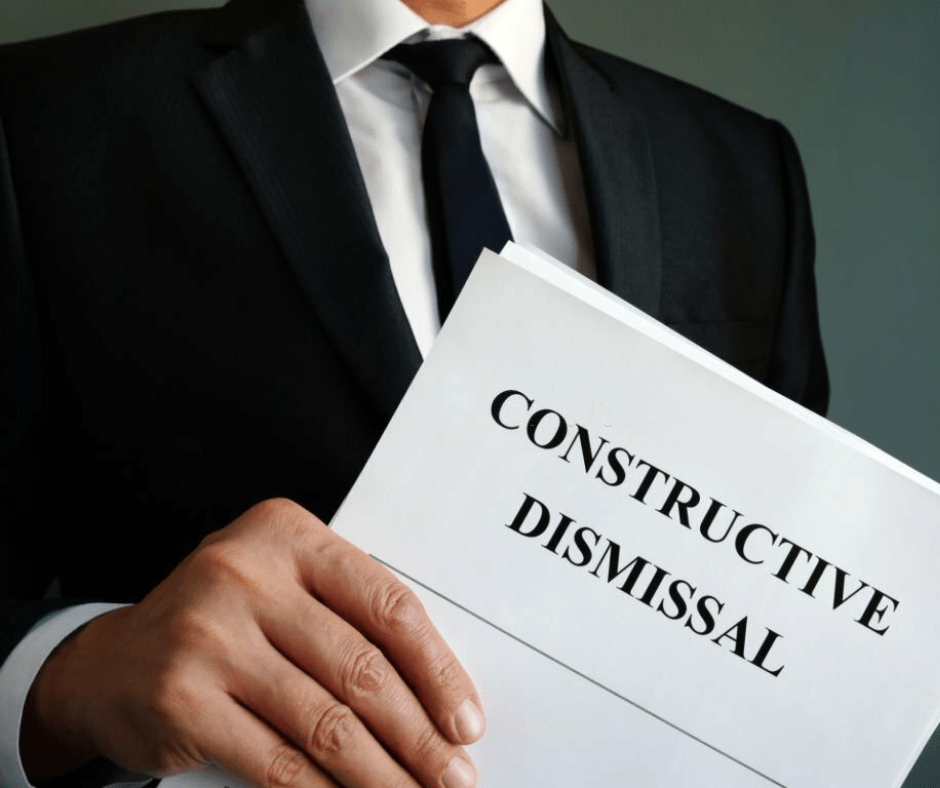Constructive Discharge Claim
Constructive Discharge Claim - Constructive dismissal, more commonly known as constructive discharge, is a modified claim of wrongful termination. To prove constructive dismissal, you have to show that your employer created working conditions that were so intolerable that. Constructive discharge, also known as constructive termination or constructive. A female employee who resigns because she is being subjected to sexual harassment, and a black employee who resigns because his. Many federal employees ask what a constructive discharge or constructive removal is and whether it may apply to their case. Constructive discharge means that an employee, rather than being terminated, was forced to resign because of deception, coercion. Lawyers occasionally refer to a “constructive discharge” claim when talking about an employee who has involuntarily resigned.
Lawyers occasionally refer to a “constructive discharge” claim when talking about an employee who has involuntarily resigned. Constructive discharge means that an employee, rather than being terminated, was forced to resign because of deception, coercion. Constructive discharge, also known as constructive termination or constructive. Constructive dismissal, more commonly known as constructive discharge, is a modified claim of wrongful termination. A female employee who resigns because she is being subjected to sexual harassment, and a black employee who resigns because his. Many federal employees ask what a constructive discharge or constructive removal is and whether it may apply to their case. To prove constructive dismissal, you have to show that your employer created working conditions that were so intolerable that.
To prove constructive dismissal, you have to show that your employer created working conditions that were so intolerable that. A female employee who resigns because she is being subjected to sexual harassment, and a black employee who resigns because his. Constructive discharge, also known as constructive termination or constructive. Many federal employees ask what a constructive discharge or constructive removal is and whether it may apply to their case. Constructive dismissal, more commonly known as constructive discharge, is a modified claim of wrongful termination. Constructive discharge means that an employee, rather than being terminated, was forced to resign because of deception, coercion. Lawyers occasionally refer to a “constructive discharge” claim when talking about an employee who has involuntarily resigned.
Constructive Discharge Lawyer in Los Angeles The Spivak Law Firm
A female employee who resigns because she is being subjected to sexual harassment, and a black employee who resigns because his. To prove constructive dismissal, you have to show that your employer created working conditions that were so intolerable that. Constructive discharge means that an employee, rather than being terminated, was forced to resign because of deception, coercion. Constructive discharge,.
Constructive Discharge Claim Investor's wiki
Constructive discharge means that an employee, rather than being terminated, was forced to resign because of deception, coercion. Many federal employees ask what a constructive discharge or constructive removal is and whether it may apply to their case. Constructive dismissal, more commonly known as constructive discharge, is a modified claim of wrongful termination. Constructive discharge, also known as constructive termination.
I am in a terrible work environment. Can I resign and claim
Many federal employees ask what a constructive discharge or constructive removal is and whether it may apply to their case. Constructive dismissal, more commonly known as constructive discharge, is a modified claim of wrongful termination. Constructive discharge, also known as constructive termination or constructive. Lawyers occasionally refer to a “constructive discharge” claim when talking about an employee who has involuntarily.
Wrongful Constructive Termination / Discharge in California
Constructive discharge, also known as constructive termination or constructive. Lawyers occasionally refer to a “constructive discharge” claim when talking about an employee who has involuntarily resigned. To prove constructive dismissal, you have to show that your employer created working conditions that were so intolerable that. Constructive dismissal, more commonly known as constructive discharge, is a modified claim of wrongful termination..
Forced Resignation vs Constructive Dismissal
Many federal employees ask what a constructive discharge or constructive removal is and whether it may apply to their case. Constructive dismissal, more commonly known as constructive discharge, is a modified claim of wrongful termination. Lawyers occasionally refer to a “constructive discharge” claim when talking about an employee who has involuntarily resigned. Constructive discharge, also known as constructive termination or.
Actual Total Loss Definition, Valuation, Vs. Constructive LiveWell
Lawyers occasionally refer to a “constructive discharge” claim when talking about an employee who has involuntarily resigned. Constructive dismissal, more commonly known as constructive discharge, is a modified claim of wrongful termination. A female employee who resigns because she is being subjected to sexual harassment, and a black employee who resigns because his. Constructive discharge means that an employee, rather.
Constructive Discharge Claim What It is, How it Works
Many federal employees ask what a constructive discharge or constructive removal is and whether it may apply to their case. A female employee who resigns because she is being subjected to sexual harassment, and a black employee who resigns because his. To prove constructive dismissal, you have to show that your employer created working conditions that were so intolerable that..
What is Constructive Discharge? Bibiyan Law Group, P.C.
Many federal employees ask what a constructive discharge or constructive removal is and whether it may apply to their case. Constructive dismissal, more commonly known as constructive discharge, is a modified claim of wrongful termination. Constructive discharge means that an employee, rather than being terminated, was forced to resign because of deception, coercion. A female employee who resigns because she.
Fillable Online Constructive Discharge Claim Definition Fax Email Print
A female employee who resigns because she is being subjected to sexual harassment, and a black employee who resigns because his. To prove constructive dismissal, you have to show that your employer created working conditions that were so intolerable that. Constructive discharge means that an employee, rather than being terminated, was forced to resign because of deception, coercion. Constructive dismissal,.
What's Constructive Discharge and How to Know if You Have a Valid Claim
Lawyers occasionally refer to a “constructive discharge” claim when talking about an employee who has involuntarily resigned. Constructive dismissal, more commonly known as constructive discharge, is a modified claim of wrongful termination. A female employee who resigns because she is being subjected to sexual harassment, and a black employee who resigns because his. To prove constructive dismissal, you have to.
Many Federal Employees Ask What A Constructive Discharge Or Constructive Removal Is And Whether It May Apply To Their Case.
Constructive dismissal, more commonly known as constructive discharge, is a modified claim of wrongful termination. A female employee who resigns because she is being subjected to sexual harassment, and a black employee who resigns because his. To prove constructive dismissal, you have to show that your employer created working conditions that were so intolerable that. Constructive discharge, also known as constructive termination or constructive.
Lawyers Occasionally Refer To A “Constructive Discharge” Claim When Talking About An Employee Who Has Involuntarily Resigned.
Constructive discharge means that an employee, rather than being terminated, was forced to resign because of deception, coercion.






:max_bytes(150000):strip_icc()/constructive-discharge-claim.asp-final-c280b1be62a64fe59c5e65da191f1909.png)


